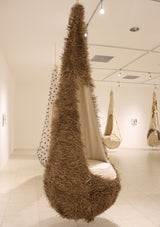Harmony
Simultaneous sounds, achievable measures, calculated pauses, languages constructed with fibers of the soul.
- Weave with natural wicker fibers. Application of details of repurposed copper from uninstalled electric energy meters.
- Technique: flat-weave made in flywheel loom, warp in raw cotton thread 20/2, weft with raw cotton thread 4/3 and natural wicker fibers. Bouquet applications of natural wicker fibers of copper thread.
- Measurement: 2.50 x 0.90 m
Lula Mena generates hope and transforms lives by connecting art, design, and culture with the reality of vulnerable women in high-risk areas of El Salvador, creating job opportunities through the design and production of unique, eco-friendly, handmade, and innovative products made under the rules of Fairtrade.
Lula believes in the empowering nature of increased economic income, especially for women, and wants to make the world a better place, one design at a time.

INCOME

 The norm in rural areas is that children between the ages of 10 to 12 work the fields with their parents taking care of crops.
The norm in rural areas is that children between the ages of 10 to 12 work the fields with their parents taking care of crops.SCHOOLING


58% of the people that live in rural areas in El Salvador live in overcrowded conditions. When there is overcrowding in families, there is a higher risk of certain problems occurring, such as domestic violence, family disintegration, poor school performance, among others.

300 SALVADORANS TRY TO MIGRATE TO THE UNITED STATES DAILY DUE TO LACK OF WORK OPPORTUNITIES.
When Lula Mena began working in rural communities, many of the young women wanted to immigrate to the United States. Now that they have seen that there is an opportunity for a better life in their community, their perception of immigration has changed. They feel more confident that they will be able to provide for their families without having to leave the country. We want to continue to grow in order to offer more young adults the opportunity to work with us and avoid immigration.

One of the major challenges we faced when we began working with women was gaining the approval of their husbands. Most of the husbands and family members worried that the women would not be able to work and meet the household’s responsibilities.
Now, their husbands prepare dinner, take care of the children, and offer them support. There is still a strong sexist culture, “machismo”, in rural areas of El Salvador that we are trying to change by empowering women.








